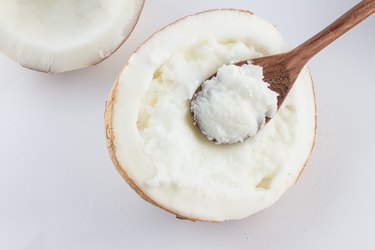
Medium-chain triglycerides (MCTs) are fats found that occur naturally in a variety of foods, such as MCT oil. If you're concerned about MCT oil calories, you might be surprised to find out that this natural supplement facilitates weight loss when used as part of a balanced diet.
Tip
According to the USDA, MCT oil has about 121 calories and 13.5 grams of fat per tablespoon.
Video of the Day
MCT Oil Nutrition Facts
Dietary fat is often blamed for weight gain. However, not all fats have the same metabolic effects. Take MCT oil, for example. According to a February 2017 study published by Practical Gastroenterology, MCTs are fatty acids with chain lengths of 6 to 12 hydrocarbons. These fats are processed differently than long-chain triglycerides (LCTs).
Video of the Day
MCT chain length allows them to be absorbed in the gastrointestinal tract and transported to the liver without incorporation into chylomicrons. The latter are small particles made up of protein and fat. This results in reduced fat storage.
These fats provide about 10 percent fewer calories than LCTs per gram. Their main advantage is that they are more rapidly absorbed by the body and more quickly metabolized as fuel because of their reduced chain length. This means that instead of being stored as fat, MCT calories are more efficiently converted into fuel by your organs and the muscles used for exercise.
MCTs and Weight Control
Winchester Hospital states that MCTs offer a triple approach to weight loss. They have a lower caloric value than other fats like LCTs, they are minimally stored as fat, and they contribute to enhanced metabolism to burn more calories. According to Harvard Health, this is often why MCT oil is used in weight loss plans, such as the keto diet and the Atkins diet.
In addition to their metabolic advantages, MCTs promote the release of ketone bodies. Ketone production is a cornerstone in the Atkins diet because it's a substance that the brain can utilize for energy.
A February 2015 meta-analysis published in the Journal of the Academy of Nutrition and Dietetics researched whether MCTs result in a negative energy balance through increased energy expenditure and lipid oxidation. Researchers have found that replacing LCTs with MCTs in the diet may induce modest reductions in body weight and improve body composition without adversely affecting lipid profiles.
MCT Oil Side Effects
Food & Nutrition states that it is important to differentiate pure MCT oil from coconut oil and to understand that there may be some potential adverse effects. Specifically, it mentions that people with liver disease should avoid MCT oil.
According to a July 2017 study published in Current Developments in Nutrition, MCTs are rapidly beta-oxidized and are ketogenic, but they may cause mild gastrointestinal side effects. These may be reduced by slowly incorporating MCTs into your diet or taking them in addition to other foods. MCTs can also increase plasma triglyceride levels, which may affect cardiovascular health.
However, MCT oil side effects are highly unlikely to occur as long as you consume only 1 to 2 tablespoons per day and use MCTs as a replacement for, not in addition to, your normal fat intake. Beware that MCT oil cannot replace any dietary or lifestyle recommendations for those with elevated blood lipids, diabetes or obesity.
Also, remember that all fats provide calories. MCT oil is no exception. If you eat too much of it, the calories will add up. Consume it in moderation to reap the benefits and avoid any potential side effects.
- United States Department of Agriculture: "Oil, Coconut"
- Cognitive Vitality: "Medium Chain Triglycerides"
- Harvard Catalyst Profiles: "Chylomicrons"
- Virginia Medicine: "The Use of Medium-Chain Triglycerides in Gastrointestinal Disorders"
- Harvard Health Publishing: "Is There a Place for Coconut Oil in a Healthy Diet?"
- Winchester Hospital: "Medium-Chain Triglycerides"
- US National Library of Medicine National Institutes of Health: "Emulsification Increases the Acute Ketogenic Effect and Bioavailability of Medium-Chain Triglycerides in Humans Protein, Carbohydrate, and Fat Metabolism"
- Chemistry Libre Texts: "Beta-Oxidation"
- US National Library of Medicine National Institutes of Health: "Effects of Medium-Chain Triglycerides on Weight Loss and Body Composition: a Meta-Analysis of Randomized Controlled Trials"
- Food & Nutrition: "Is MCT Oil a Miracle Supplement or Just Another Fad?"